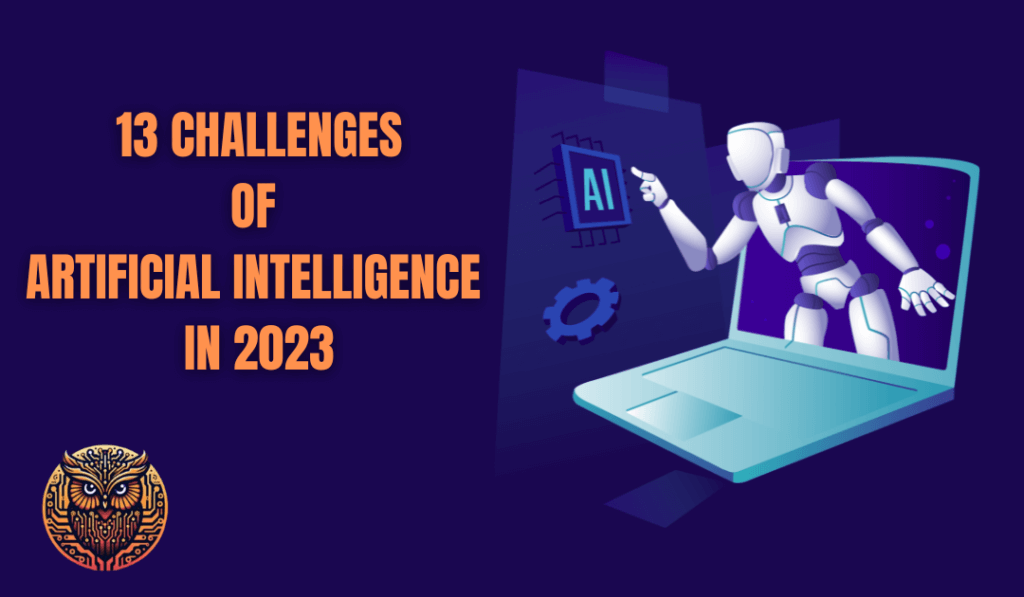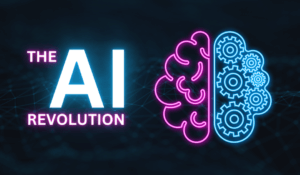Challenges of Artificial Intelligence In 2023:
Artificial intelligence (AI) is a rapidly developing field with the potential to revolutionize many aspects of our lives. However, AI also poses a number of challenges that need to be addressed before it can be widely adopted and used safely and responsibly.
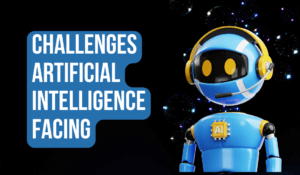
Addressing The Challenges of Artificial Intelligence
Artificial intelligence (AI) is changing our world quickly, but it’s not easy. Like someone going through a maze, AI faces many problems that could stop it from moving forward. These problems, like bias, accountability, safety, and scalability, need our attention and creative solutions.
Here are 13 of the top challenges AI is facing in 2023, with some solutions
- Bias
- Accountability
- Privacy
- Safety
- Learning
- Common Sense
- Creativity
- Scalability
- Reliability
- Robustness
- Interpretability
- Generalizability
- Social Impact
Bias in AI Systems:
Artificial Intelligence systems can be biased when trained on data that is not representative of the real world. This can lead to discriminatory outcomes, such as when AI systems used to make decisions about loan applications deny loans to people of color at a higher rate than white people.
Solution:
Collect and use diverse data sets to train AI systems. This will help to ensure that Artificial Intelligence systems are not biased against any particular group of people.
Accountability of AI Systems:
AI systems can be difficult to understand and explain. This can make it difficult to trust them and hold them accountable for their decisions. For example, it can be difficult to understand why an AI system made a particular decision, such as why it denied a loan application.
Solution:
Develop Artificial Intelligence systems that are more transparent and explainable. This will help to ensure that people understand how AI systems make decisions and that they can be held accountable for their actions.
Privacy in Artificial Intelligence Applications

AI systems can collect and store vast amounts of data about people. This data can be used to track people, manipulate them, or even harm them. For example, AI systems could be used to identify and target people for advertising or political campaigns.
Solution:
Develop strong privacy protections for Artificial Intelligence systems. This will help to ensure that people’s data is protected and that it is not tracked or manipulated without their consent.
Safety of AI Systems:
AI applications in autonomous vehicles, healthcare, and other critical domains raise concerns about safety and potential harm. Ensuring the safety and reliability of AI systems is paramount to their widespread adoption.
Solution:
Ensuring the safety of AI systems involves implementing rigorous safety protocols. This includes testing AI systems extensively for potential failures or vulnerabilities, establishing clear human oversight mechanisms, and prioritizing safety in the design and development process.
Learning in AI Systems:
AI systems need to be able to learn from data without explicit programming, a challenging task that requires them to understand and generalize from diverse data sets.
Solution:
To enhance learning capabilities in AI systems, it is essential to develop new AI algorithms that are better able to learn from data, enabling AI to continuously improve its capabilities.
Common Sense in AI Systems:
AI systems need to be able to understand common sense knowledge, such as the fact that objects fall down when they are not supported. This is a difficult challenge, as common sense knowledge is often implicit and difficult to formalize.
Solution:
Develop new AI systems that can better understand common sense knowledge.
Creativity In AI Systems:
AI systems need to be able to be creative, such as generating new ideas or solving problems in new ways. This is a difficult challenge, as creativity requires AI systems to be able to think outside the box and come up with new and original ideas.
Solution:
To foster creativity in AI systems, it is essential to develop new AI systems that are more creative, enabling them to tackle complex problems and generate innovative solutions.
Scalability of AI Systems:
AI systems need to scale efficiently to handle large amounts of data and complex tasks without compromising performance. Scalable AI architectures are essential for real-world applications.
Solution:
Enhancing the scalability of AI systems involves developing new AI algorithms that are more scalable, enabling AI to operate effectively with large-scale data and complex tasks.
Reliability of AI Systems:
AI systems need to be reliable and accurate in their decision-making, especially in critical domains like healthcare and finance. Minimizing errors and ensuring reliability is crucial for AI’s trustworthiness.
Solution: To enhance the reliability of AI systems, it is essential to develop new AI systems that are more reliable and accurate, ensuring they make consistent and trustworthy decisions.
Robustness of AI Systems
AI systems need to be robust to adversarial attacks and manipulation attempts. Ensuring AI’s resilience against malicious actors is essential for its secure operation.
Solution:
To enhance the robustness of AI systems, it is essential to develop
Interpretability of AI systems:
AI systems need to be interpretable so that humans can understand how they make decisions. This is a difficult challenge, as AI systems can be complex and opaque.
Solution:
Develop new AI systems that are more interpretable.
Generalizability of AI systems:
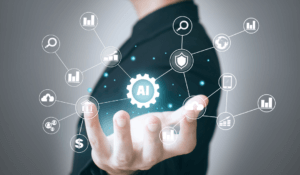
AI systems need to be generalizable so that they can be applied to new problems and situations. This is a difficult challenge, as AI systems can be overfitted to specific data sets.
Solution:
Develop new AI systems that are more generalizable.
Social impact of AI systems:
AI systems can have a significant social impact. It is important to consider the potential social impacts of AI systems before they are deployed.
Solution:
Develop ethical guidelines for the development and use of AI systems.
Conclusion:
The path forward for AI is not without its hurdles. As we continue to explore the vast potential of AI, it is imperative to address the challenges that hinder its progress and ensure its responsible and ethical development. By tackling bias, enhancing explainability, safeguarding privacy, and prioritizing safety, we can pave the way for a future where AI seamlessly integrates into our lives, empowering us and enhancing our world.
FAQs About Challenges of Artificial Intelligence:
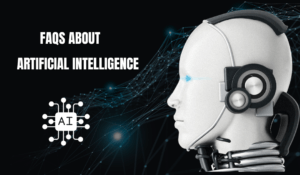
What are the key challenges faced by Artificial Intelligence?
AI faces a multitude of challenges that hinder its progress and hinder its potential for positive impact. These 13 challenges include bias, explainability, privacy, safety, learning, common sense, creativity, scalability, reliability, robustness, interpretability, generalizability, and social impact.
Why is addressing the challenges of Artificial Intelligence important?
Addressing the challenges of AI is crucial to ensure its responsible and ethical development and deployment. By tackling these challenges, we can mitigate potential risks, enhance trust in AI systems, and maximize their benefits for society.
How can we address the challenge of bias in Artificial Intelligence systems?
To address bias in AI systems, it is essential to employ diverse data sets for training, ensuring that the data accurately represents the real world. This helps prevent AI systems from perpetuating existing biases and making discriminatory decisions.
How can we make Artificial Intelligence systems more explainable?
Enhancing the explainability of AI systems involves developing more transparent and interpretable models. This allows humans to understand the reasoning behind AI decisions, fostering trust and accountability.
How can we protect privacy in AI-driven applications?
Protecting privacy in AI-driven applications requires establishing strong privacy safeguards. This includes implementing data minimization practices, obtaining informed consent for data collection and usage, and enforcing strict data protection regulations.
How can we ensure the safety of Artificial Intelligence systems?
Ensuring the safety of AI systems involves implementing rigorous safety protocols. This includes testing AI systems extensively for potential failures or vulnerabilities, establishing clear human oversight mechanisms, and prioritizing safety in the design and development process.

